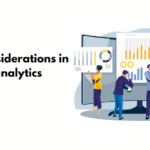As data analytics becomes increasingly integral to decision-making across industries, ethical considerations surrounding its use are more crucial than ever. Organizations harness vast amounts of data to drive insights, optimize operations, and enhance customer experiences. However, this powerful capability comes with significant ethical responsibilities. This article explores the key ethical considerations in data analytics, emphasizing the importance of integrity, transparency, and respect for privacy.
Understanding the Ethical Landscape
Ethics in data analytics encompasses a set of principles that guide how data is collected, analyzed, and used. With the rise of big data, artificial intelligence (AI), and machine learning, organizations must navigate a complex landscape where ethical dilemmas often arise. These dilemmas can have far-reaching implications for individuals, businesses, and society as a whole.
1. Informed Consent
One of the fundamental ethical considerations in data analytics is informed consent. Organizations must ensure that individuals are aware of what data is being collected, how it will be used, and who will have access to it. Informed consent involves providing clear and comprehensible information about data practices, allowing individuals to make knowledgeable choices about their participation.
For instance, companies must avoid hidden clauses in their privacy policies that could mislead users about data usage. Transparency fosters trust, and organizations that prioritize informed consent are more likely to build strong relationships with customers.
2. Data Privacy
Data privacy is at the forefront of ethical discussions in analytics. With increasing regulations like the General Data Protection Regulation (GDPR) and the California Consumer Privacy Act (CCPA), businesses are obligated to protect personal information. Ethical data practices involve implementing robust security measures to prevent unauthorized access, data breaches, and misuse of sensitive information.
Organizations should adopt a privacy-by-design approach, incorporating privacy considerations into their analytics processes from the outset. This includes limiting data collection to what is necessary and anonymizing data wherever possible to reduce the risk of re-identification.
3. Bias and Fairness
Bias in data analytics can lead to unfair treatment of individuals or groups, perpetuating inequalities. Algorithms trained on historical data can inadvertently reflect societal biases, leading to discriminatory outcomes. For example, predictive policing algorithms may disproportionately target marginalized communities if they are based on biased crime data.
To address these ethical concerns, organizations must actively work to identify and mitigate bias in their data and algorithms. This includes diversifying data sources, employing fairness-aware algorithms, and regularly auditing analytics processes to ensure equitable outcomes.
4. Accountability and Transparency
Accountability is a critical component of ethical data analytics. Organizations must take responsibility for the decisions made based on data insights and ensure that these decisions align with ethical standards. Transparency in analytics processes helps stakeholders understand how decisions are made and fosters trust in the outcomes.
For instance, if an organization uses predictive analytics for hiring decisions, it should be transparent about the criteria used and the potential biases in the data. Stakeholders should be able to question and challenge decisions, promoting a culture of accountability.
5. Data Stewardship
Data stewardship refers to the responsible management of data throughout its lifecycle. Organizations must ensure that data is collected, stored, and used ethically and responsibly. This includes establishing data governance frameworks that outline policies and procedures for data management.
Effective data stewardship involves training employees on ethical data practices and fostering a culture that prioritizes ethical considerations. Organizations should empower data stewards to uphold ethical standards and address potential ethical dilemmas in their analytics work.
6. Impact on Society
Data analytics does not exist in a vacuum; its implications extend to society at large. Organizations must consider the broader societal impact of their data practices. For example, the use of data analytics in areas like healthcare, criminal justice, and finance can have profound effects on individuals and communities.
Businesses should assess the potential consequences of their analytics initiatives, ensuring that they contribute positively to society. Engaging with stakeholders, including affected communities, can provide valuable insights into the ethical implications of data use.
7. Regulatory Compliance
Compliance with data protection laws and regulations is an essential aspect of ethical data analytics. Organizations must stay informed about relevant laws and ensure that their practices align with legal requirements. Failure to comply can result in legal penalties, reputational damage, and loss of customer trust.
Staying ahead of regulatory changes involves regular training for employees, auditing data practices, and establishing clear policies for data usage. Organizations should also be proactive in communicating their compliance efforts to stakeholders.
Best Practices for Ethical Data Analytics
To navigate the ethical complexities of data analytics, organizations can adopt several best practices:
- Establish a Data Ethics Framework: Develop a comprehensive framework that outlines ethical principles guiding data collection, analysis, and usage.
- Promote Transparency: Clearly communicate data practices to stakeholders, including how data is collected, used, and shared.
- Implement Privacy Measures: Prioritize data privacy by minimizing data collection, anonymizing data, and securing sensitive information.
- Address Bias: Regularly audit algorithms and data sources to identify and mitigate biases, ensuring fair outcomes.
- Engage Stakeholders: Involve stakeholders in discussions about data practices and seek feedback on potential ethical implications.
- Train Employees: Provide ongoing training on ethical data practices to ensure that all employees understand their responsibilities.
- Monitor and Adapt: Continuously assess data practices and adjust policies in response to changing ethical standards and societal expectations.
Conclusion
As data analytics continues to shape decision-making in various industries, ethical considerations must remain at the forefront. By prioritizing informed consent, data privacy, fairness, accountability, and responsible stewardship, organizations can harness the power of data while upholding ethical standards. Ultimately, a commitment to ethical data analytics not only builds trust with customers and stakeholders but also contributes to a more equitable and just society. For those looking to enhance their understanding of these principles, enrolling in a Data Analytics Training Program in Delhi, Noida, Lucknow, Meerut, Indore and more cities in India can provide valuable insights and skills. Embracing these ethical guidelines will be essential for organizations aiming to thrive in an increasingly data-driven world.

